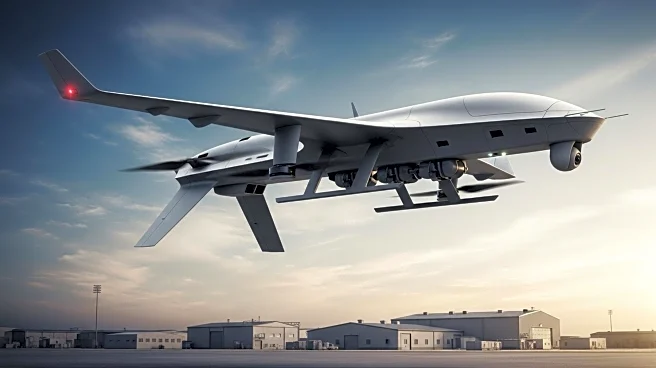What's Happening?
Lt. Col. Phil Ferris, an airpower strategist on the Air Staff, has argued that the U.S. Air Force should take responsibility for defending its own airfields, rather than relying on the U.S. Army. Ferris suggests that the Air Force should handle defense against small drones and low-flying cruise missiles, while the Army focuses on high-altitude threats like ballistic missiles. This call comes amid concerns about potential attacks on American air bases, particularly in the event of conflict with China. The current defense arrangement, based on the 1948 Key West Agreement, assigns ground-based air defense to the Army, but Ferris contends that the Air Force must develop its own comprehensive air and missile defense plan.
Why It's Important?
The proposal to shift air base defense responsibilities to the Air Force highlights the evolving nature of military threats, particularly from drones and cruise missiles. This change could lead to a reallocation of resources and responsibilities within the U.S. military, potentially impacting defense strategies and budgets. The Air Force's ability to independently defend its bases could enhance its operational flexibility and readiness, especially in regions like the Indo-Pacific where threats are dense. However, this shift may also strain the Air Force's resources and require significant investment in new defense technologies.
What's Next?
If the Air Force adopts Ferris's recommendations, it will need to develop and implement a comprehensive air and missile defense strategy, including acquiring new defense systems and technologies. This could involve collaboration with other military branches and defense contractors to ensure effective protection against emerging threats. The Air Force may also need to train personnel in new defense tactics and technologies, potentially leading to changes in military training programs and doctrines.
Beyond the Headlines
The debate over air base defense responsibilities reflects broader discussions about military roles and inter-service cooperation. It raises questions about the effectiveness of existing defense agreements and the need for modernization in response to new threats. Additionally, the focus on drone and missile defense underscores the growing importance of technological innovation in military strategy, as well as the ethical and legal implications of autonomous defense systems.









